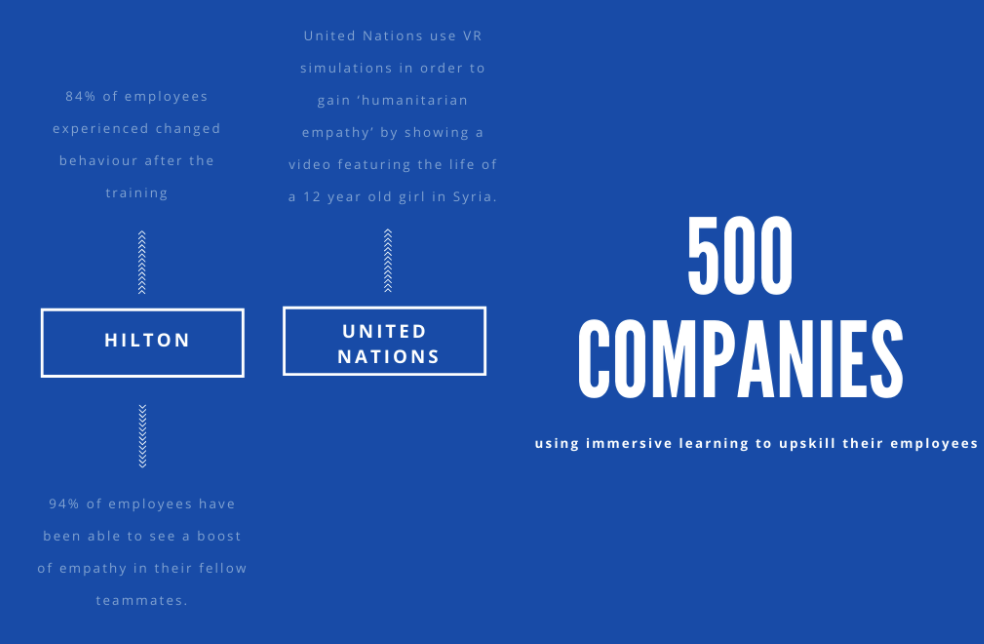Build an empathetic workplace
In today’s technology era, empathy may be regarded as the most essential asset to have in the workplace. Having a team of empathetic staff has become essential to the overarching success of many areas of business. Empathy is necessary in order to build meaningful work relationships, create positive influences towards success and stand out amongst competition in the industry. This article will break down why employees and customer relationships will flourish in a workplace that actively supports an empathetic culture. Promoting such behaviours leads to more effective communications and in turn circumstantial outcomes.
Walking a mile in their shoes
Incorporating virtual reality (VR) technology is an amazing new way to deliver soft skills training. It is efficient and effective. VR is extending beyond the gaming and sales applications and is starting to make its mark in the vocational skills and workplace training verticals. Well-constructed and interactive training using VR, participants feel 3.75 times more emotionally connected to the content and the learning is more meaningful when compared to the passive experience of a classroom or online learning.
VR technology used for work integrated learning experiences evokes realistic visceral responses from the participant. The feeling of immersion increases the reality of actually being there. They may even take on the role of a person within the scenario and feel what the character/person feels. For example, those who may have a mental illness, a disability, or are in their senior years. This example of “walking in another person’s shoes” experience, enables the participant to improve their awareness of others who are in need of assistance, a service or care.
Gaining a deeper understanding, trainees are better equipped to provide the most appropriate help. Providing opportunities to put into practise knowledge and skills, developing their level of confidence. Furthermore, the greater their level of engagement, the lesser the distractions – features of efficiencies, time and cost-savings.
Could the same be achieved using online activities, textbook exercises, 2D videos or case studies? No.
VR – Is it the ultimate Empathy Generator?
VR was first referred to as the ‘Empathy Machine’ by Chris Milk, the Co- Founder and CEO of Within, a Virtual Reality technology company. “Virtual Reality is a technology that could actually allow you to connect on a real human level, soul to soul, regardless of where you are in the world.” Experiencing these carefully designed scenarios in virtual reality, the brain registers the event as very real. Due to this experience a stronger sense of connection to the training is achieved. It is providing staff with opportunities to experience being in their customers shoes, which helps them understand customer needs and expectations better, hopefully motivating them to meet these requirements and deliver quality service experience.
The creation of training scenarios using VR can be applied across industries.
Now is the time for to implement these training solutions especially in areas of medical and health for the most vulnerable, in mental illness, disability and aged care sectors.
Simulated scenarios can be designed for new healthcare professionals to experience ‘a day in the life’ of their patients. To encapsulate daily struggles, how they feel and how they may react to different verbal and non-verbal cues. For example, the healthcare professional could play the role of an Alzheimer’s patient on an outing in the park. Going through the simulation in the role (of the patient), sympathy is transferred to empathy. The intern develops a better understanding, learns how to anticipate the needs, implement consistent best practises and deliver quality care that is patient focused.
The technology of VR is a powerful tool used to enhance human capacity of emotional intelligence which translates into better work communications and environments in all kinds of industries.
When using VR training to obtain such outcomes, careful selection of content, researching technically correct language and practices is absolutely essential. The immersion sensitizes people towards situations, and therefore needs to be executed carefully and thoughtfully. The learning design needs to better equip them to handle sensitive, high risk or dangerous situations, to develop their critical thinking and appropriate decision-making processes. Being empathic to co-workers and clients, from diverse backgrounds and going through this type of immersive training can help develop a more homogenous, respectful and inclusive workforce team. As well as empower employees to perform their duties and manage difficult situations with confidence in order to bring value to wherever they go.
VR Empathy Training in Action
Fortune 500 companies like Walmart (retail company), and Hilton Hotels and Resorts are using VR training to upskill their employees, helping them step into the new era of immersive learning. Hilton, being the largest and most significant example in the hospitality industry, has introduced its employees to a learning set called ‘Hotel Immersion’ which aims to enhance development of their hospitality-specific and interpersonal skills. Completing training scenarios such as managing aggressive or demanding guests, participants practice interacting in real-life situations. The learning experience allows them to become familiar with different ways of responding, improving their preparedness when confronted in the real world.

The Hilton group is also using VR for training staff in the ‘62-Step method’ for cleaning guest rooms. A case study conducted by Oculus on Hilton’s experience with VR training stated that 84% of employees experienced changed behaviour after the training, and 94% of employees have observed a “boost of empathy” in their fellow team mates.
The United Nations use VR simulations to gain ‘humanitarian empathy’ by showing a video featuring the life of a 12 year old girl in Syria. As people are unable to be in the refugee camp and experience it, films such as Clouds over Sidra enables the viewer to step into these lives.
Research evidence indicates the feeling while in a VR experience helps the brain build neural connections that register the experience (better memory recall), and as a real experience. This affects behaviours and decision-making skills. Therefore this type of empathy training is more impactful and effective.
The Bottom Line
Over a hundred employees across different industries have been immersed into VR training to further develop their soft skills. Results indicate performance improvements in all areas of their work. Soft skills training research (including emotional intelligence – empathy), provides measurable results in the benefits received, leading to improvement of related soft skills like better communication, effective problem solving, integrity and dependability.
Could this be the right path for your organisation? Schedule a free consultation with YesVR to find out how Empathy Training (and soft skills) would be suitable for your needs.
Written by Simran Singh
Similar articles to check out:







